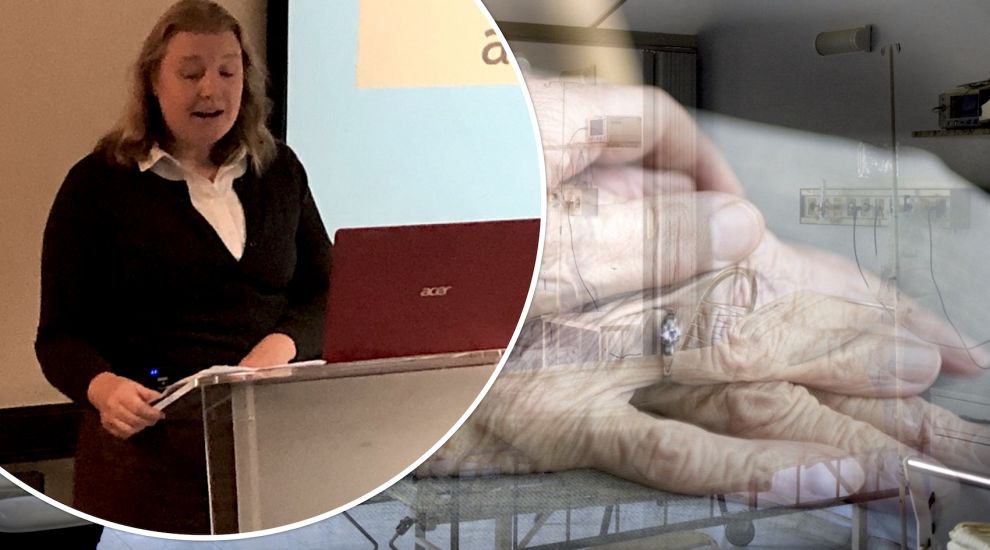


A Jersey consultant psychiatrist has said the island must focus on bringing its "inadequate" elderly care services and mental health support up to scratch before considering legalising assisted dying.
According to Dr Rachel Ruddy, who recently founded 'Our Duty of Care', the care on offer for individuals with dementia is currently falling short, while not enough people with terminal illnesses are being referred on for wellbeing support.
Such factors, she argued, could influence whether or not individuals wish to opt for assisted dying.
Plans to allow medical professionals to prescribe lethal drugs or give voluntary euthanasia to individuals with terminal illnesses or experiencing “unbearable suffering” that cannot be alleviated are due to face a vote in Jersey’s States Assembly next week, following recommendations by a Citizens’ Jury.
Last night, an event presenting counter-arguments to the proposal took place, hosted by former Chief Minister Terry Le Sueur.

Pictured: Under Ministers' proposals, a patient would have to be undergoing "unbearable suffering" as a result of a terminal condition or an incurable physical condition to be eligible for assisted dying.
During the event, which was attended by the Health Minister, Dr Rachel Ruddy said she was glad to be able to provide a psychiatric view on the matter, which had not been offered to the Citizens Jury.
She firstly raised concerns about the ‘Werther Effect’ – a phenomena whereby background suicide rates rise when there is heightened publicity on the matter, and noted that suicide rates had increased by a third in the Netherlands since assisted suicide had been legalised.
“In Jersey we are working really hard to bring our suicide rates down, do we really want to introduce measures that will make them rise?”
She further questioned how “unbearable suffering” could be used as a criteria, describing it as a “useless phrase”.
“There is no generally accepted definition in law, there’s no generally accepted definition in research literature.. How can we as doctors and nurses… be trained or skilled to make a decision in something so nebulous?” she asked.
The key thrust of her argument, however, was that the option of an early death should not be presented to islanders without first ensuring that all end-of-life services and support are as good as they can be.
While she praised the support provided by Jersey Hospice for those with terminal illnesses, she suggested that many care facilities supporting the elderly were falling short and noted that Jersey does not have an end-of-life dementia ward.
“We do not have adequate care facilities in Jersey for people with end-of-life dementia, and other conditions with behaviour that challenges. We continually find that people are being sent into the General Hospital because the care home doesn’t want to cope with them anymore. This was their home. When your tenancy comes to an end on a rented flat, you’re given a month’s notice. These people are kicked out that day,” she explained.
“Some care homes are boring, unstimulating places where people feel as though they are waiting to die. How many actually have activities? Staff to spend time with people? Staff who are adequately paid to spend time with people? Do we help our frail, elderly, ill residents to feel valued and part of society?
“Jersey, we could do so much better in this area. We have a real opportunity here on this island to make our institutions, our island culture, one that can bring joy to the last chapter of someone’s life. And until we do, is it right to offer those suffering euthanasia?”
She further queried the low referral rates for mental health support among those with terminal illnesses, noting that they are three times more likely than the average person to suffer depression, and may therefore look to assisted suicide as an option.
“Depression is not just a consequence of cancer diagnosis… It warrants accurate diagnosis and aggressive treatment to reduce suffering, and evidence suggests this can make a real difference to people’s length and quality of life even in terminal conditions,” said Dr Ruddy.
She continued: “…Here in Jersey we rarely receive psychiatric referrals for assessment for people with cancer from GPs, and from the General Hospital. It could be that the Hospice or the GPs are treating this perfectly well, but my suspicion is that it’s not being recognised and it’s not being referred. And it is hard to differentiate depression from physical symptoms of cancer – it does require a specialist. Cancer makes you tired, gives you lack of motivation, gives you a poor appetite, and it’s hard to sometimes know whether this is the cancer or the depression, but until we start getting this right here, I suggest that people could be experiencing unbearable suffering which is treatable and therefore would be euthanised unnecessarily."
The doctor also raised questions about Jersey’s ability to assess the capacity of individuals that may request assisted suicide to consent.
At present, the law states that anyone without a diagnosed “impairment or disturbance” in the functioning of their mind or brain can be assumed to have capacity, Dr Ruddy pointed out. She also noted that the law does not require that all doctors and nurses receive training in this area.
“There is a danger that capacity to consent in assisted dying might be assumed in many cases and not formally assessed,” she said.
“We certainly see this at the moment in the General Hospital that capacity is often assumed and not formally assessed and it can make a different to people’s treatment and care when it’s done properly.”
Dr Ruddy added: “It’s also really difficult in Jersey to get truly independent second opinions because as doctors we do know each other and you might think, ‘Let’s get someone from outside to do it.’ But what we found, looking at jurisdictions like the Netherlands where it has been outsourced to a private provider, the rates have massively increased because people are really only interested in the money for the assessment not in terms of thinking about whether this person truly should be allowed access to the assisted dying.”
She also noted that many people may not “understand the rights they already have over their own lives” under the Capacity Law and that, in fact, assisted dying may not be needed. This includes the ability to create an advance “directive” declining treatment in certain circumstances – whether at the beginning of treatment or towards the end of life – and doctors have a “duty of care” to support that decision,” she said.
Pictured: Dr Ruddy said people already had plenty of rights of choice over the end of their lives, including where they should be and what treatment should or should not be accepted.
“Studies have shown that when older people have written advance directives, they’ve had significantly better management at the end of life – more in line with their wishes than those who have not done this.
“I rarely see an advance directive in the patients I’m treating. I don’t know how much people know about this and whether this is something that might change people’s minds on needing a euthanasia bill.”
Finally, Dr Ruddy questioned the potential effects on staff.
She pointed out that in Canada and Oregon, there was a big “difference” between the number of surveyed doctors and nurses who supported the legislation and those who were willing to carry it out.
Beyond faith and moral reasons, she said it was mostly due to the potential “psychological burden” on them – which she suggested could persist “long-term” in up to a fifth of cases.
She also said there was “evidence of pressure and intimidation on doctors” to carry out wishes for assisted dying when they don’t think it “appropriate”.
“Our staff are still actively involved in and feeling the psychological effects of caring for patients with covid, do we really want to put them through this as well?”
Turning to a survey of Jersey doctors in 2019, she noted that just 21 of the island’s 300 doctors were recorded as being strongly in favour, while nurses were not asked for their view.
She has now penned an open letter to the Health Minister, and is asking other health professionals who share her concerns to support it.
Dr Ruddy was joined at last night’s event by UK panellists Gordon MacDonald, CEO of UK campaign group ‘Care Not Killing’ and Peter Williams, Communications Manager at the Anscombe Bioethics Centre.
Express will be continuing to share the arguments for and against assisted dying over the coming week. Keep following for updates…
Deputy calls for closer look at assisted dying plans
Ministers take first steps towards legalising assisted dying
FOCUS: Citizens' Jury supports assisted dying
Assisted dying campaigner passes away peacefully in Jersey
Jerseyman with place at Dignitas hopes island will allow assisted dying
‘Jury’ to receive £300 for considering assisted dying question
‘Jury’ to consider assisted dying in Jersey
Comments
Comments on this story express the views of the commentator only, not Bailiwick Publishing. We are unable to guarantee the accuracy of any of those comments.